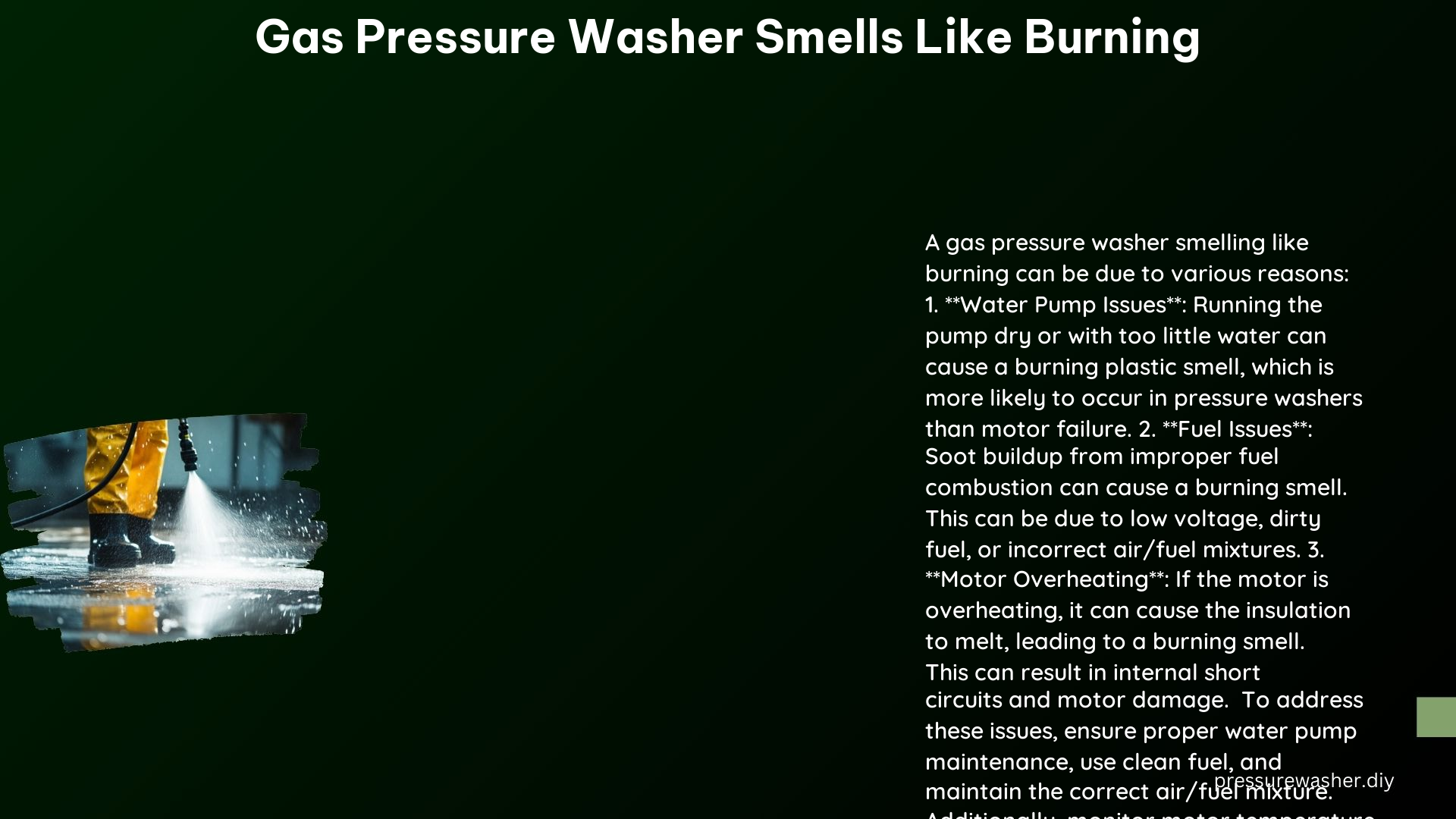If your gas-powered pressure washer is emitting a burning smell, it’s a clear sign that something is amiss. This issue can be caused by a variety of factors, ranging from an overheating motor to problems with the water pump. As an expert on the subject, I’ll provide you with a detailed, step-by-step guide to help you diagnose and address the problem.
Causes of Burning Smell
1. Overheating Motor
One of the most common causes of a burning smell in a gas pressure washer is an overheating motor. When the motor’s insulation begins to melt, it can lead to internal short circuits and a significant loss of power. This type of damage can be severe and may ultimately render the motor unusable.
In the past, it was possible to repair electric motors by rewinding the windings, but this is no longer a cost-effective solution for smaller motors. The insulation used in modern motors is typically made of enamel or plastic film, which can be more susceptible to heat-related damage.
2. Burning Insulation
Another potential cause of the burning smell is the melting of the insulation on the motor windings. This damage can be difficult to assess, and the motor may continue to function for a while before suddenly failing. The insulation material used in pressure washer motors is typically designed to withstand high temperatures, but prolonged exposure to excessive heat can still lead to its degradation.
3. Internal Short Circuits
When the insulation on the motor windings melts, it can create internal short circuits within the motor. These short circuits can further exacerbate the problem, leading to a reduction in the motor’s power output and an increase in the burning smell.
4. Water Pump Issues
In some cases, the burning smell may not be coming from the motor at all, but rather from the water pump. If the pump is running dry or with insufficient water, the resulting friction and heat can cause the plastic components to melt and emit a burning odor. Addressing water pump issues is often more expensive than replacing the motor, as the pump is a more complex and critical component of the pressure washer.
Prevention and Maintenance

1. Regular Maintenance
To prevent the issues that can lead to a burning smell, it’s essential to regularly inspect and maintain your gas pressure washer. This includes checking the pump, motor, and other components for signs of wear or damage, and addressing any problems before they escalate.
2. Proper Voltage
Ensuring that the voltage supply to the motor is correct is crucial to prevent overheating and improper operation. Fluctuations in voltage can cause the motor to work harder than necessary, leading to excessive heat buildup and potential damage.
3. Clean Fuel
Using clean, fresh fuel is important to prevent soot buildup and ensure proper combustion. Adding soot removers to diesel fuel can help reduce the accumulation of soot, which can contribute to the burning smell.
4. Electrode Adjustment
Properly adjusting the electrodes in the pressure washer’s engine can help prevent soot buildup and ensure efficient combustion, reducing the likelihood of a burning smell.
5. Air/Fuel Mixture
Ensuring that the air/fuel mixture is correct is crucial to prevent incomplete combustion, which can lead to soot buildup and a burning smell. Adjusting the carburetor or fuel injection system may be necessary to achieve the optimal air/fuel ratio.
Technical Specifications
The insulation on the motor windings in a gas pressure washer can be made of various materials, such as enamel or plastic film. The type of insulation used can affect its resistance to heat-related damage.
To diagnose issues with the motor’s insulation, a megger test can be performed. This test can detect problems with the insulation between the windings and the frame, but it cannot detect issues between individual winding turns.
DIY Repair and Replacement
While it may not be cost-effective to repair smaller motors, taking the motor to a repair shop for a megger test can help determine the extent of the damage. If the motor is beyond repair, replacement may be necessary.
If the water pump is the source of the burning smell, replacing it may be required. This can be a more expensive repair than replacing the motor, as the water pump is a more complex and critical component of the pressure washer.
References
- https://diy.stackexchange.com/questions/259904/is-an-overheating-motor-on-electric-pressure-washer-ruined
- https://www.youtube.com/watch?v=B0Tuqjhg1pA
- https://www.justanswer.com/small-engine/kt1za-using-running-ryobi-2000-psi-pressure-cleaner.html
- https://www.reddit.com/r/MechanicAdvice/comments/i6ognl/just_bought_a_simpson_pressure_washer_smell_sort/
- https://hotsyofmemphis.com/is-your-pressure-washer-smoking/
